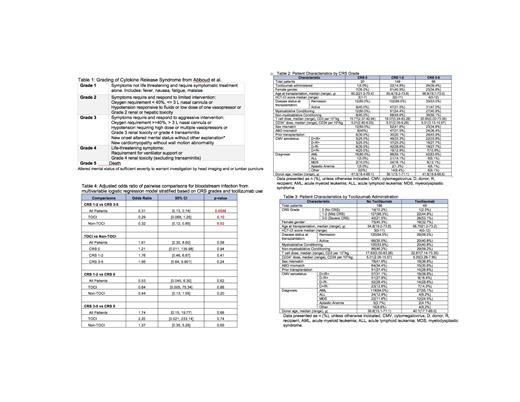Abstract
Introduction: Cytokine release syndrome (CRS) is a potentially fatal systemic inflammatory response that can occur in patients undergoing haploidentical hematopoietic cell transplantation (haplo-HCT). IL-6 inhibitors, such as tocilizumab, are effective therapy in moderate to severe cases. Several studies have shown there to be a significant increase in infections with the use of tocilizumab in patients with rheumatoid arthritis, where it is given on a long term basis unlike in the post-haplo-HCT setting, where tocilizumab is rarely given for more than a few days. Severe CRS has been associated with increased infection risk in prior studies. However, the effect of anti-IL-6 therapy on infection risk has not been well established in the early haplo-HCT setting.
In this study, we examined the effect of tocilizumab for treatment of CRS on the incidence of blood stream infections (BSIs) in the early post peripheral blood haplo-HCT setting.
Patients and Methods: We performed a retrospective analysis of 235 patients who underwent T cell-replete peripheral blood haplo-HCTs from 2013 to 2020, stratified on CRS grade (graded by Lee criteria) and tocilizumab administration, for incidence of BSI. Positive blood cultures during days +2 to +28 post-haplo-HCT were included. Patients with positive blood cultures during the immediate peri-transplant period (days -5 to +1) were excluded as infection preceded CRS and tocilizumab administration. Patients who had positive blood cultures within 48 hours of CRS diagnosis were excluded as sepsis cannot be distinguished from CRS.
Results: The overall incidence of bloodstream infection was 17% with 41 out of the total 235 patients having positive blood cultures. Patients with mild CRS had lower incidence of infection than patients with severe CRS (OR 0.31, 95% CI 0.13-0.74, p=0.0086). In the tocilizumab group, 31% (15/49) of patients had positive blood cultures compared with 14% (26/186) in the non-tocilizumab group (OR 1.61, 95% CI 0.30-8.60, p=0.58). However, after controlling for CRS grade, tocilizumab administration was not associated with higher rates of BSIs for any grade of CRS.
Conclusions: Severe CRS after haplo-HCT is associated with higher risk of early BSI. However, tocilizumab therapy does not further increase risk of BSI in the early post-haplo-HCT setting. These data suggest that tocilizumab, a potentially life saving therapy, can be given without increasing risk of blood stream infections after haplo-HCT.
No relevant conflicts of interest to declare.


This feature is available to Subscribers Only
Sign In or Create an Account Close Modal